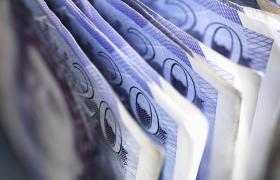TGIF everyone. Michael Buble has officially defrosted and began singing carols with less than 20 days until Christmas. Have you finished your gift shopping? I haven't. Markets are still powering on despite the upcoming holiday, with Trade War discussions and the UK election reaching their deadlines. General market sentiment has improved, which is generally great news for the Aussie dollar. Unfortunately such is not the case today, with the AUD underperforming against other G10 currencies off the back of some less than festive domestic data. With this in mind, one Aussie dollar will buy you:
0.6645 US dollars
71.0541 Japanese yen
0.5903 Euros
0.4991 Great British pound
0.8462 Canadian dollars
1.0072 New Zealand dollars
0.876 Singapore dollars
While the AUD has improved against some currencies, like the USD, since last week, it has depreciated on gains it made earlier this week. Protect your travel money by adding Rate Move Guarantee to your purchase in-store. It's free, and if the rate improves within 14 days of purchase, we will refund you the difference*. Now that's what I call Merry and Bright Mr Buble.
Let's take a look at what's impacting foreign exchange markets.
In the USA
The USD saw downward pressure against all major currencies except the Aussie dollar overnight. Why? Well, there are a few reasons:
-
There is renewed optimism around the trade war between the US and China. Trump has said that things are "moving along well", and China mirrored his sentiment. US negotiators expect a phase one trade deal to be completed by December 15, in addition to scrapping the planned tariff increase on the same day. While this is positive news and has definitely put a positive spin on markets, the Trade War is known for providing some false hope. Long story short, this information isn't set in stone and could change multiple times in the next nine days before the deal is expected to be complete.
-
Impeachment proceedings against President Trump continue to gather momentum. This definitely would have added extra downward pressure on the USD.
-
Downside risks to global economic growth have reduced. In other words, the global economy seems to be doing a little better, which means foreign exchange markets are willing to invest more in 'riskier' currencies. The USD is considered to be a safe-haven currency, so it sees a lower demand in a risk-on market like this one.
Tonight all eyes will fall to the release of the US non-farm payrolls data, which essentially shows employment figures for everyone that doesn't work on a farm. Markets expect the US economy to have added 184k new jobs, keeping the unemployment rate on hold at 3.6%. If the data undershoots these expectations, we could see further downward pressure on the USD.
In the UK
Another element that is adding to the improved sentiment about global markets is recent polls that indicate Boris Johnson's Conservative party is still on track to gain a slim majority government. With the election six days away, the prospect of a Conservative win has boosted the value of the Great British pound, making it one of the best performing G10 currencies overnight.
Should the Conservative party gain a majority government, Johnson has reiterated his pledge to deliver a budget and 'Get Brexit done!' by January 31. Further to this, he is confident in his abilities to secure a trade deal with the European Union by December 31 2020. Long story short, we are looking down the barrel of another year-long saga of trade negotiations. Ho Ho No, thanks.
In Australia
The poor old Aussie dollar is not having a great time thanks to some less than impressive domestic data released this week.
October retail sales were flat despite market expectations of 0.3% growth. Furthermore, the Aussie trade surplus decreased to $4,504million. Markets expected it to come in at $6,500million. The cherry on top is household consumption, which now hovers around 1.2%, down from 1.4% the prior year.
What does all of this mean? Well, the Aussie economy is not speeding up like the Reserve Bank of Australia and Government had hoped, and the three interest rate cuts and $7.8billion worth of tax relief we have seen this year has done little to stimulate the economy. It will be interesting to see the RBA's next move, as their previous cuts have not had their desired effect. Either way, the Aussie economy needs something to kick it into gear.
In other news…
This week the Organisation of the Petroleum Exporting Countries (OPEC) met with their allies and agreed to cut oil output to prevent an oversupply and support oil prices. Existing supply will be cut by 1.2million barrels of oil per day (is anyone else overwhelmed by this many barrels??), and will stay in effect until the end of March 2020.
At the moment, markets are unsure of how these cuts will be distributed as the deal is still yet to be ratified. How these cuts are distributed amongst different countries, including Australia, could have an impact on the foreign exchange market.
All things considered, it's worth keeping an eye on the news if you are planning on purchasing foreign currency for your festive getaway. A global or domestic event could have an impact on the amount of cash you'll be taking in your trusty travel wallet.
This blog is provided for information only and does not take into consideration your objectives, financial situation or needs. You should consider whether the information and suggestions contained in any blog entry are appropriate for you, having regard to your own objectives, financial situation and needs. While we take reasonable care in providing the blog, we give no warranties or representations that it is complete or accurate, or is appropriate for you. We are not liable for any loss caused, whether due to negligence or otherwise, arising from the use of, or reliance on, the information and/or suggestions contained in this blog. All rates are quoted from the Travel Money Oz website and are valid as of December 6 2019. Terms and conditions apply to Rate Move Guarantee.














